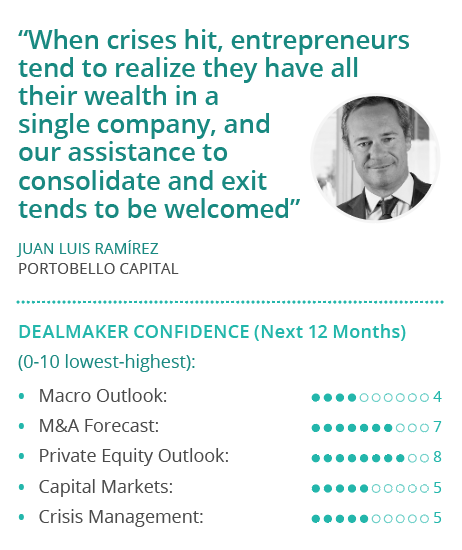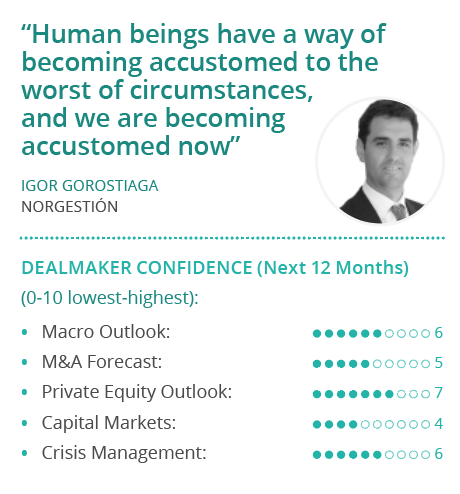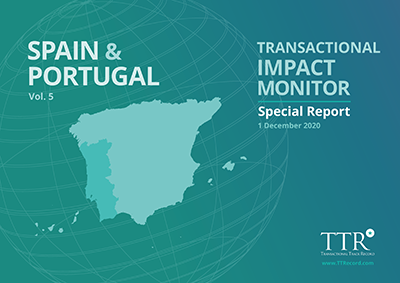Transactional Impact Monitor: Spain & Portugal – Vol. 5
1 December 2020
TTR’s Transactional Impact Monitor (TIM) is a Special Report combining local knowledge and market visibility from top dealmakers developed to address extraordinary situations affecting the macroeconomic stability and M&A outlook in core markets
INDEX
SPAIN
– M&A Outlook
– Private Equity
– Capital Markets
– Handling the Crisis
PORTUGAL
– M&A Outlook
– Private Equity
– Capital Markets
– Handling the Crisis
– Dealmaker Profiles
SPAIN
The Spanish economy will be among the most severely affected by the global crisis that upended life across the world in 2020. Despite a moderate rebound in 3Q20, Spain’s GDP was down 8.7% compared to the same nine-month period ending a year prior, according to the International Monetary Fund (IMF). IMF economists project a 12.8% slide by year-end as federal and regional governments impose new restrictions on movement and business activities.

Spanish companies have contracted government guaranteed debt amounting to 7% of GDP to shore-up their finances, but the country’s small and medium-size enterprises (SMEs), which account for 70% of overall economic activity, remain highly vulnerable and dependent on fiscal measures to remain solvent. About 37% of the debt contracted by Spanish companies is estimated to be at risk, according to the IMF, foreshadowing impending insolvencies for many in 2021.
“The wave of restructurings is coming,” said DLA Piper Spain Senior Partner Iñigo Gomez-Jordana. More troubling than the imminent onslaught of insolvencies, is the persistent lack of clarity where mitigation measures and their duration are concerned, however, Gomez-Jordana said.
New restrictions should be accompanied by guidance on how long they will last so that everybody can set their expectations, he said, noting there was a broad divergence among countries of the EU on approach, with poor coordination between them. “All this just serves to foment uncertainty,” he said.

“There’s a more pessimistic climate in Spain than in neighboring markets, which is affecting the macro situation,” said Norgestión Managing Partner Igor Gorostiaga. The lack of coordination was understandable in March, but the fact that this continues almost nine months later is confounding, Gorostiaga said.
Large companies and banks raised a lot of debt immediately after the lockdown to be solidly positioned in the face of uncertainty. The volume of senior and high yield issuances was very high, and there were plenty of investors ready to buy, Gomez-Jordana noted. Convertible debt issuances were down to a trickle, however, with few companies willing to risk equity at discounted rates amid the volatility, he said.
“I think there’s a general conviction that this situation is transitory,” said Gomez-Jordana. Of course, it’s important that the large companies that employ thousands don’t run into problems, and they need to maintain their cash reserves in an uncertain market, he added.

“Where the macro outlook is concerned, I tend to be an optimist,” said Portobello Capital Founding Partner Juan Luis Ramírez. “This crisis is better than the last, in that once it’s resolved, we’re going to return to normal more rapidly, as we have a healthy financial system,” he noted. Governments have injected historic sums into the economy, which should ultimately result in inflation to the benefit of debtors, he added.
Traditional retail, on the other hand, which was already suffering as e-commerce took at growing piece of the market, has been dealt a severe blow, Hernández noted. An acceleration of the migration online and away from brick and mortar among major retailers is a clear outcome of the current crisis, he said.
M&A Outlook
… Click here to access the fourth issue of Transactional Impact Monitor: Spain & Portugal – Vol. 5.
PORTUGAL

The Portuguese economy is projected to contract by 10% in 2020, according to the IMF, with unemployment pushing 14%. A moderate recovery with 5% GDP growth is projected in 2021, with a drop in unemployment to 8.7%. The Portuguese government’s stimulus measures aimed at supporting income, preserving employment and ensuring liquidity will amount to nearly 3% of GPD in 2020, according to Banco de Portugal’s October Bulletin, not enough to stave off its economic contraction, which outpaced most other markets of the Eurozone in 1H20.
“Currently the economic outlook is negative, but the full extent of the contraction will depend on the severity of the second wave and the measures that might be needed to control it,” said Deloitte Partner João Diogo Pinto. “If we don’t have full lockdown, we’ll be living under constrained economic conditions for the foreseeable future, and we may be heading for a third wave in 2021 as well,” Pinto said. The leisure, hospitality and retail industries have been decimated, he noted, with weak prospects for recovery in the near term.

Restaurants are open again, but new government measures in force since mid-October limit the number of people that can congregate to five, and with many working remotely or in rotation at the office, half the customers are completely missing, noted SRS Advogados Partner Paulo Bandeira. The Portuguese government’s 2021 budget being resolved in parliament has offered a value-added tax voucher, which will allow patrons to claim back a portion of what they spend in restaurants in 1Q21 the following quarter to encourage consumption and support the sector. Restaurants are happy with the measure, but the effective benefits will only accrue to consumers from April onwards, Bandeira noted. Meanwhile, the government upped its state of alarm and mandated mask wearing in public through the end of 2020 in a new law passed in late October.
M&A Outlook
… Click here to access the fourth issue of Transactional Impact Monitor: Spain & Portugal – Vol. 5.

